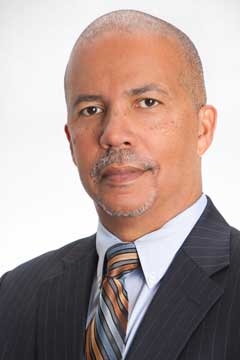You have /5 articles left.
Sign up for a free account or log in.

Donald Generals
Community College of Philadelphia
Despite faculty concerns that its pick for president might be unfit for the job, the board of the Community College of Philadelphia confirmed Donald Generals Jr. as the institution’s new leader on Thursday.
Generals, vice president for academic affairs at nearby Mercer County Community College in New Jersey, formerly served as provost at the embattled and now-defunct Katherine Gibbs School of New York. The for-profit institution was accused by state officials of making false promises to students before it announced it was closing in 2008. Faculty have also raised concerns that it was left out of the hiring process, in contrast to past presidential searches.
Meanwhile, Community College of Philadelphia has said that faculty members were given a chance to meet and ask questions of its pick for president weeks ago during public forums, and that the new president comes thoroughly vetted.
“[S]erious concerns, both educational and ethical in nature, have recently come to light concerning the policies, practices, curricula, and student outcomes at the Katharine Gibbs School, Manhattan, during Dr. Donald Generals' tenure as provost there, from 2003-2008,” reads a resolution passed earlier this week by the representative council of Community College of Philadelphia’s Faculty and Staff Federation, a union affiliated with the American Federation of Teachers.
The resolution urged the Board of Trustees to postpone offering Generals a contract until “these matters can be more fully studied by the board or its designees.”
"Our primary concern has to do with the process,” said Steve Jones, union co-president and an assistant professor English as a second language. “We in the union are used to a process in which we’re invited as an organization to participate in the presidential search, and that did not happen this time.”
But faculty members also are concerned about Generals’ time at Katharine Gibbs.
“We do know that it was a troubled institution, and we do know that he was a leader there,” Jones said. “It’s not fair to Dr. Generals to hang the problems at Katharine Gibbs on him, but because we as an organization weren’t involved in the search, we haven’t had a chance to explore that.”
Katharine Gibbs-New York was the largest of nine two-year campuses on the East Coast run by Career Education Corporation. All have now closed, although some have reopened under new names. In 2007, when Generals was provost, the New York State Education Department cited the Manhattan campus for having too few full-time faculty members, an inadequate remedial education department and having instructors teach outside their fields. It also told it to limit its enrollment, The New York Times reported at the time.
Scores of students also have reported other problems with the college on consumer websites, including that it grossly misrepresented graduation and admission rates and transferability of its credits to four-year institutions. Katharine Gibbs-New York also was part of a “60 Minutes” expose on for-profit colleges on CBS in 2005.
The institution announced it was closing, along with other Katharine Gibbs campuses, in 2008, the year Generals left for Mercer.
Jones said that faculty members were concerned not only about Katharine Gibbs’ practices but also that Generals had been part of the for-profit sector at all.
“We’re aware of the fact that that sector has got a very problematic record, as it relates to student debt, for instance,” he said.
Jones said that issue had come to light in a public meeting Generals held on campus when he was still one of three candidates for the job, last month. Generals said he’d “been to the belly of the beast,” and that community colleges needed to do a better job of marketing themselves as alternatives to for-profit institutions, Jones said.
“So it’s also true that Dr. Generals shared some of that skepticism, apparently based on his experience at Katharine Gibbs,” Jones said.
At the time of that forum, however, faculty members were still largely unaware of the depth of the dysfunction at Katharine Gibbs. Only in the last week, and since Generals was named as the board’s pick for president, did the most alarming details surface among the faculty, union leaders said.
But even before specific concerns about Katharine Gibbs emerged, Generals was the faculty’s last pick for president in an informal straw poll. Instructors said Generals is the first president since the founding of the school to not first have been a sitting president. Jones described the faculty as strong-willed, best fit for a seasoned leader.
The college’s previous president, Stephen M. Curtis, left in 2013 with two years left on his contract. He had served at the institution since 1999. To date, no public reason has been given for the decision. Judith Gay, vice president for academic affairs, is serving as interim president.
Generals, who will begin at Philadelphia in July, did not immediately respond to a request for comment.
Linda Wallace, Community College of Philadelphia spokeswomen, said that the board was aware of the faculty union’s concerns, but that Generals had been thoroughly vetted.
He was approved unanimously on a three-year contract with a base pay of $235,000.
Matthew Bergheiser, chair of the college’s Board of Trustees, said in a news release that Generals “is a dynamic thinker with a deep and longstanding passion about the work of community colleges.”
Bergheiser continued: "He impressed the Board as a skilled administrator who understands the barriers to education that confront many of our students, and he has built his distinguished career on developing innovative approaches to overcoming them.”
In an email, Patricia Donohue, Mercer’s president, said she had “total confidence” in Generals’s ability to lead Community College of Philadelphia.
“[Generals] has been an outstanding chief academic officer who has supported the faculty in many ways and moved forward an educational master plan,” Donohue said. “Faculty have developed and expanded innovative programming under his leadership and he supported faculty in programs with academic and curriculum issues."
Jones said the faculty wanted some “accountability” from the board, but said of Generals: “Our job is to work with him and that is what we’re going to do.”









